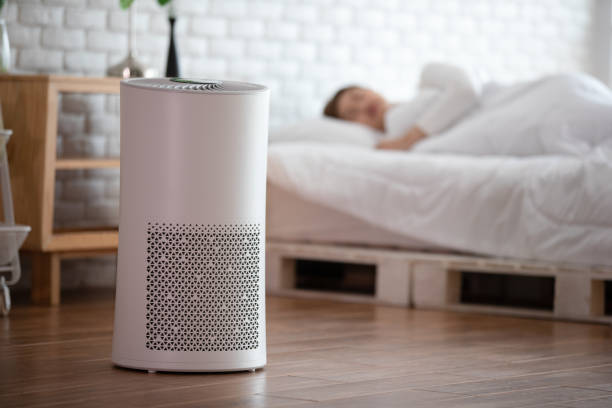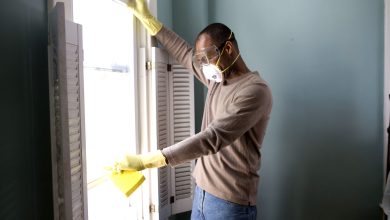Choosing Air Purifier for your Bedroom

If you are using an air purifier to improve your indoor air quality, then it makes sense to make sure you are using it in the room where you spend the most time: your bedroom. Since most people spend eight hours a day or more in the bedroom, keeping the air in that room clean can have significant benefits. In fact, scientists refer to this as the “sleep breathing zone,” and air quality studies often focus on this part of the house.
But which air purifier is the best for the bedroom? Do you want a small, quiet air purifier, or would you prefer one that makes some white noise? Is a HEPA filter best for the bedroom, or is some other technology preferable? What if you have allergies or asthma? We will answer these questions and find out what air purifier is best for the bedroom.
Read our Samsung air purifier review to help you decide better.
How to choose an air purifier for your bedroom
To determine the best air purifier to use in a bedroom, we need to look at the most important factors for air quality and air purifier performance for a bedroom set.
- Pollutants: A bedroom can contain particulate pollutants such as dust, dust mites and dust mite feces, pet dander, pollen, mold spores, or particles from tobacco or wood smoke. You could potentially inhale these particles while you sleep. There might also be gaseous pollutants, such as volatile organic compounds (VOCs) from outgassing mattresses or carpets, household chemicals, or tobacco smoke. So the ideal air purifier for your bedroom will be able to handle both types of pollutants. However, if you know that one particular type of pollutant is more of a problem for you (because you have allergies, for instance), then an air purifier that can handle that type of pollutant best will be more effective for you. We will talk in more detail about air purifier technologies shortly.
- Room size: The size of the room is another factor to consider. The Clean Air Delivery Rate (CADR) number on an air purifier is not an ideal way to determine how much air it can clean, but it is a rough guide to how much air will flow through the purifier while it runs. If you have a large bedroom, a small purifier with a very low CADR number may not clean the air quickly enough to impact your air quality. Installing a co2 monitor in the room helps too.
- Noise: Some people prefer a quiet or silent air purifier, while others sleep better with the white noise of an air purifier’s fan running. Here again, the CADR number can be used as a rough guide. High CADR air purifiers tend to have larger, more powerful (and louder) fans. You can also look at online reviews to get a better idea of how loud a particular air purifier is.
Can air purifiers help you sleep better?
The negative effects of poor air quality are well-established (Vijayan et al., 2015), and the benefits of improving indoor air quality have been studied as well (Sublett, 2011). But whether or not an air purifier in the bedroom can improve your sleep has not been as thoroughly documented. Nevertheless, many of the pollutants mentioned above can irritate the respiratory system, and if you have allergies, allergens in the room can cause an allergic reaction. Inflamed nasal passages, itchy eyes, and sneezing are not conducive to a good night of sleep, so removing allergens from the air may help.
Get the best HEPA air purifier for Covid Australia by Euromate Pure Air.
Air purifiers for small bedrooms
There are a few things to consider if you will be using an air purifier in a small bedroom, such as a child’s room or a bedroom in a small apartment.
The CADR rating on an air purifier can give you a rough idea of the volume of air it can clean, and some air purifiers even provide the square footage of space in which they are effective. However, the CADR rating simply refers to how much air is being pushed through the purifier, so a large and powerful fan can give a purifier a high rating. But if the purifier is designed inefficiently, it won’t be as effective at cleaning the air, and thus will clean less air than its CADR rating indicates.
Nevertheless, the CADR rating does offer some idea of how much space the purifier is intended to be used in. High CADR purifiers will probably be too loud in a small bedroom.
Should I run an air purifier all night?
Many people ask the question, “Should I run my air purifier all night while I’m asleep?” To get the most benefit from your air purifier, you should run it 24/7 so that it is constantly cleaning the air, and this is true at night as well.
This means that the noise the air purifier makes will be something you hear throughout the night. Air purifiers are more effective when they use fans because they clean more air that way. Look for a HEPA filter with a low-speed mode if noise is a concern. PECO air purifiers also have a silent mode. If you prefer the white noise of a fan, then a HEPA filter with the fan running constantly will be ideal for you. Something with a very high CADR rating might be too loud, however.
Some air purifier technologies that operate silently are not recommended, especially for bedrooms, because they generate ozone. Ozone generators, ionic purifiers, electrostatic precipitators, and UVC light purifiers are not a good choice for bedroom use. These air purifiers produce ozone, either intentionally or as a side-effect. The EPA found that these types of air purifiers can create ozone concentrations above recommended levels. Especially in an enclosed space like a bedroom. Ozone is a lung irritant and toxin. We do not recommend their use in general. And they could be even more harmful to your health when used overnight in a bedroom.
The best air purifier for your bedroom
The best air purifier for the bedroom is one that can address particles in your bedroom. That can trigger allergies or affect sleep. As well as one that is able to meet the needs of the size of the room, whether big or small. And is quiet (or has the constant white noise of a fan).
HEPA: A HEPA filter will provide effective air purification in the bedroom, they are rated to remove 99.97 percent of all particles 0.3 microns in size. This will work against allergens such as mold spores, dust mites, pollen, pet dander, as well as other particulate pollutants.
Carbon filter: These are often combined with a HEPA filter to create a hybrid filter. The Carbon filters remove gaseous pollutants such as VOCs from the air. Carbon filters also require regular changing, as they lose their effectiveness when they become saturated with molecules.
PECO: A PECO air purifier uses a photochemical reaction to destroy allergens and gaseous molecules in the air. Rather than simply trapping them in a filter. It also can optionally be run on silent mode, which might be preferable for bedroom use.
No matter what the size of your bedroom or your sleep habits and preferences are. Choosing the right air purification system can be a crucial factor in maintaining your long-term health. All of these factors will help you make the best choice for yourself and your loved ones. And to help save them from air pollution.





